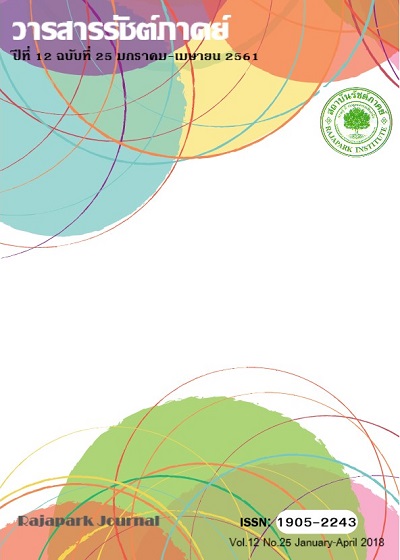Developing Perceptions and Brand Equity to Enhance the Potential of Adventure Tourism in Bencha Burapha Suvarnabhumi Provinces
Main Article Content
Abstract
The objective of the study was to developing perceptions and brand equity to enhance the potential of adventure tourism in Bencha Burapha Suvarnabhumi provinces. The finding of the study were as follow: the personal factors of tourists had an effect on the brand equity and perception of adventure tourism as a whole at the 0.01 level of statistical significance. The potential factors of adventure tourism in natural resources and marketing could best predict its brand equity as a whole with predictive coefficient weighting of .431, 0.220 and 0.146, respectively as a whole could predict the brand equity in adventure tourism significantly, and they were in a positive direction on all sides. The adventure tourism’s brand equity affected perceptions of adventure tourism at the statistical significance are perceived quality, brand loyalty, and brand awareness. When considering deeper, it was also found that the personal factors of tourists, the potential factors, and the brand equity influenced the overview of adventure tourism perception 98.5 percents. The influential factors are natural resources; activities; marketing; brand associations; brand awareness; Bachelor’s degree; travel; age 30-39; journal/magazine/guidebook, and student/college student.
Article Details
Views and opinions appearing in the Journal it is the responsibility of the author of the article, and does not constitute the view and responsibility of the editorial team.
References
Aaker, J. I. (1997). ‘Dimension of Brand Personality’. Journal Marketing Research.Vol. 34.
Hall, (1992) in Sung, H. H., (2000), ‘An analysis of the adventure travel market: From conceptual development to market segmentation’.
Sorenson, (1993). in Sung, H. H.(2000), ‘An analysis of the adventure travel market: From conceptual development to market segmentation’.
Swarbrooke, J. (2003). Adventure tourism: The new frontier. Oxford: Butterworth-Heinemann.
Wanichbuncha, Kallaya, (2007). Statistics for Research, (3rd ed.). Bangkok: Chulalongkorn University.


